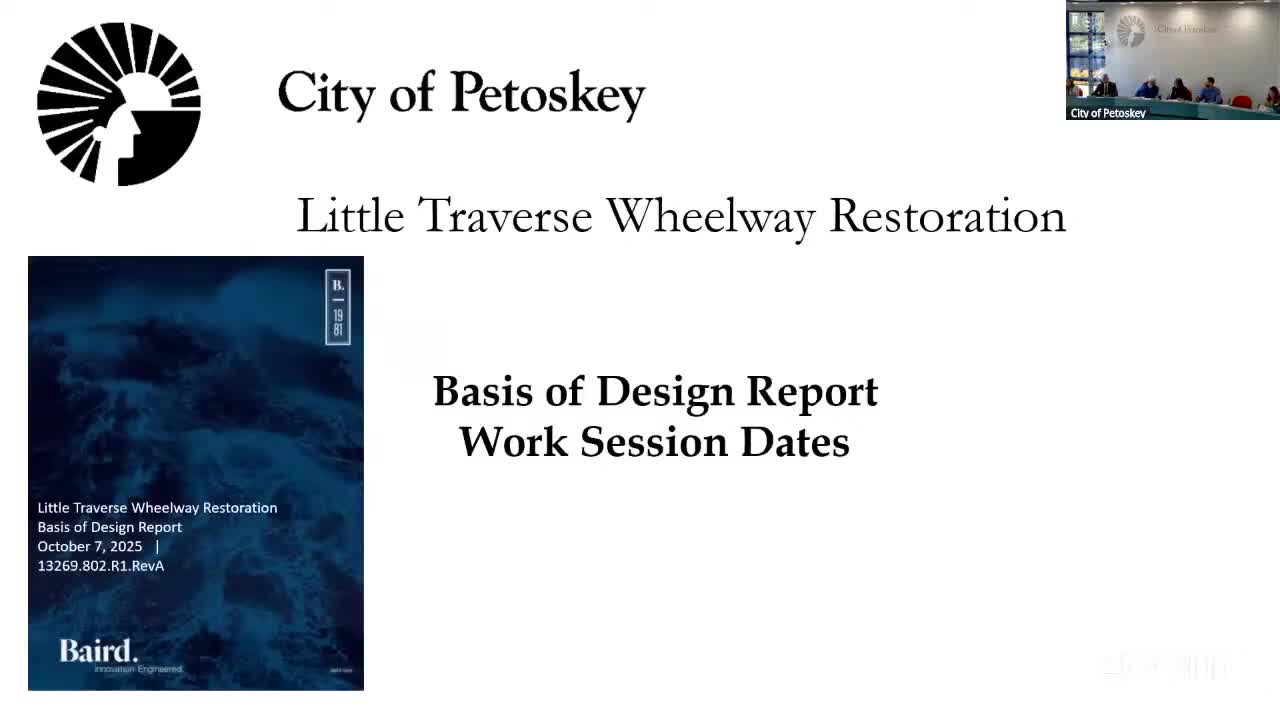Petoskey council schedules work session on Wheelway restoration after engineers deliver 300‑page basis of design
Get AI-powered insights, summaries, and transcripts
Subscribe
Summary
City officials agreed to hold a public work session to review a 300‑page basis of design by Baird for the Wheelway restoration; project has an $800,000 grant, a $200,000 local match and early cost estimates that include a $13 million stone purchase and significant transport costs.
Petoskey City officials said they will hold a public work session to review a 300‑page basis of design for the Wheelway restoration after engineers from Baird completed the study and delivered detailed bid‑ready documents.
City Manager Shane Horn told the council the basis of design is lengthy and that Baird’s engineer, Rory, should attend a separate session so residents and councilmembers can review plans and ask questions. "This is just informational, a very good opportunity for you all to ask questions during it as well to kinda get a good understanding of the scope," Horn said.
The council and staff said the design work was funded in part by an $800,000 grant with a $200,000 local match and that the city has paid Baird $181,923 to date. Horn said the documents are essentially bid‑ready except for permits. "We have not submitted any permits to EGLE or, the core," Horn said, adding that staff paused permit submission pending council direction.
Why it matters: the report describes large material and transportation costs for rebuilding the trail where it failed. Horn said one line‑item in Baird’s materials called for about $13 million in stone for a cobble approach; he said hauling that material would require long truck runs because barging is not feasible in the area. Horn told the council the stone likely would be trucked through Sheboygan from Ontario, producing substantial transportation expenses.
Councilmembers and staff discussed options to reduce cost, including value‑engineering and investing in a hydraulics model to refine designs before procurement. Horn said such modeling could cost about $100,000 but might reduce the need for large volumes of imported stone and could save “millions of dollars” in construction costs.
Council members expressed a desire for public engagement before any commitment. Mayor John Murphy asked that the presentation be clearly presented as exploratory: "It needs to be noted that this restoration presentation does not mean we're moving forward," he said.
Next steps: staff and Baird will plan a public work session with concept boards and a higher‑level presentation followed by a council discussion; Horn said he will coordinate dates and logistics by email. No binding funding decision was made; Horn and council said financing options — including bonds, state appropriations or multi‑jurisdictional contributions from Emmet County and Resort Township — would need separate review before any authorization to proceed.
The council also discussed the project timeline and permitting needs and requested cost‑reduction scenarios be presented at the work session.
